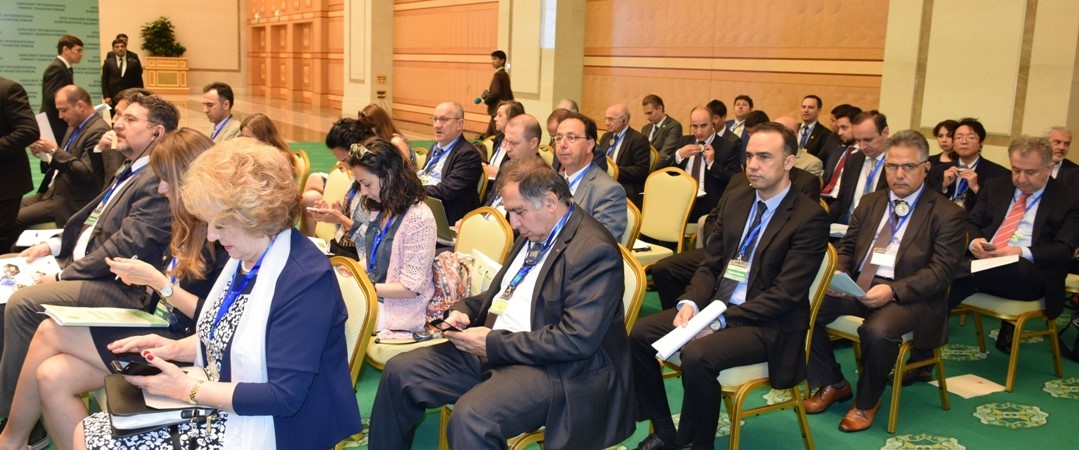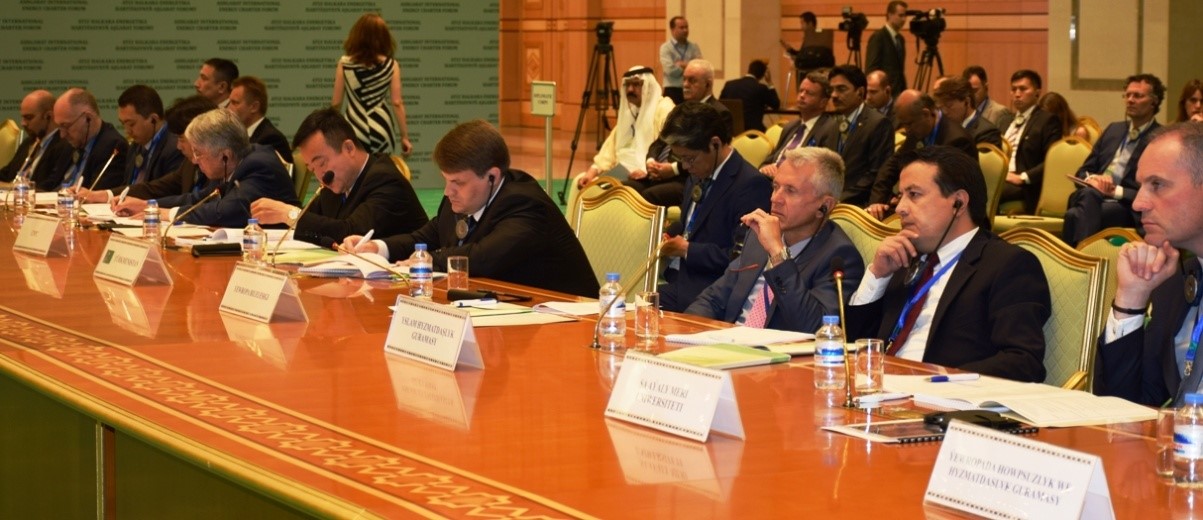nCa Report
Ashgabat, 31 May 2017 (nCa) — The Energy Charter Forum, being held in Ashgabat, 30-31 May 2017, is a microcosm of how the global energy security should be treated and managed —– shared hopes and aspirations grappling incrementally with clashing chaos and doubts.
The theme of the Forum, the first major Energy Charter event under the chairmanship of Turkmenistan, is: Towards a Multilateral Framework Agreement on Transit of Energy Resources.

Urban Rusnak, the secretary general of the Energy Charter, who anchored the inaugural session, said in his remarks that the development of new procedures for the supply of energy resources to the world markets would serve the best interests of the producing countries, the consumers and the transit countries.
He mentioned that in the light of two UN resolutions initiated by Turkmenistan “On Reliable and Stable Transit of Energy Resources and its Role in Provision of Sustainable Development and International Cooperation” considerable work had been done already for streamlining the energy transit issues and mechanisms.

In this context, he said that the Energy Charter and Turkmenistan were working closely together. Four international meetings of the experts were organized for joint solution of the issues of reliable and stable transport of energy carriers in Ashgabat in December 2014, in Brussels in April 2015, in Peking in November 2015 and in Tirana in June 2016.

Urban Rusnak noted that the Energy Charter’s goal is to provide safe, unstoppable and uninterrupted transit with more efficient use of the infrastructure. He highlighted the importance of the development of clear rules for facilitation and provision of the safety of transit, support of the construction, expansion and modernization of the infrastructure as well as the development of regulation mechanisms of disputes and emergency situations.
Maksat Babayev, the deputy prime minister of Turkmenistan for the oil and gas sector, said that reliability and security of international energy flows and legal protection of energy supply routes are of increasingly crucial importance. The need is obvious for developing generally acceptable, universal approaches to the problem, and clear and unchanging guidelines for the relationship between the suppliers, transit parties and consumers of energy resources.

He said that Turkmenistan was fully committed to the close collaboration with the Energy Charter partners under clearly defined principles, and primarily the principle of freedom of transit.
For Turkmenistan, as a supplier that holds the key position on the Central Asian crossroads of trade and transport routes and a country that initiates several major international and regional energy projects, energy security and stable transit of energy resources are strategic issues, he said.

Babayev said that international cooperation in the sphere of energy is among priority issues for Turkmenistan that initiated two UN General Assembly resolutions on “Reliable and stable transit of energy and its role in ensuring sustainable development and international cooperation”. Turkmenistan promotes these initiatives in international organizations: the UN, the OSCE and the Energy Charter Conference of which the country has been a full-fledged member since 1997, he said.
Maros Sefcovic, the Vice President of the European Commission, said in his video address to the Forum that shortly the Caspian and Central Asian Region and the European Union would develop beneficial cooperation in different spheres, including energy.
Sefcovic praised the signing of Ashgabat Declaration on outcomes of quadrilateral meeting – EU-Azerbaijan, Turkey-Turkmenistan, which had set the foundations for creation of special working group of these countries with participation of Georgia. He congratulated Turkmenistan with completion of project of East-West pipeline and ongoing work on TAPI.

In addition to the secretary general and the chair of Energy Charter, the inaugural session was addressed by:
- State minister of energy of Romania (coming chair 2018)
- Ambassador of Japan to Turkmenistan, Takahiko Katsumata (Japan was chair of Energy Charter in 2016)
- Afghanistan’s Minister of Energy and Water, Ali Ahmad Usmani
- Minister of Energy and Mineral Development of Uganda, Ms. Irene Muloni
- Secretary General of the International Energy Forum, Mr. Sun Xiansheng
- Secretary General of Economic Cooperation Organization, Mr. Halil İbrahim Akça
- Deputy minister of energy and industry of Albania (Energy Charter chair in 2019)
- Deputy minister of energy of Belarus, Vadim Zakrevskiy
- Deputy minister of energy of Georgia
- Deputy minister of energy infrastructures and natural resources of Armenia, Hayk Harutyunyan
- Deputy minister of energy of Iran
- Head of Division, Oil & Gas Markets, Crisis Prevention, Federal Ministry of Economic Affairs of Germany, Stefan Rolle
- General Manager of CNPC branch office in Ashgabat, Deng Minmin
- Representative of OSCE

The opening session was followed by three main sessions on “Natural Gas Markets: cross-border transport and transit”, “Increasing role of LNG in global energy security” and “Bringing oil to Market”.

The participants of the Forum include the delegations of the Energy Charter member countries from Albania, Austria, Armenia, Afghanistan, Belarus, Great Britain, Germany, Georgia, Kazakhstan, Kenya, Lithuania, Mongolia, Poland, Romania, Slovakia, Tajikistan, Turkey, Ukraine and Japan as well as observing countries like USA, India, Iran, China, Italy, the Republic of Korea, Pakistan, Senegal, Uganda, and Yemen.
There are also representatives from the UNECE, EU, ECO, OIC, USAID, the World Bank, ADB, EBRD as well as major oil and gas companies like CNPC and British Petroleum.
Several international media outlets are covering the event. /// nCa